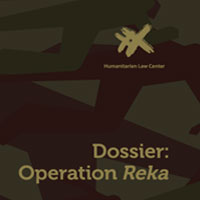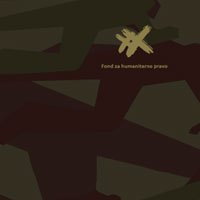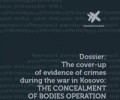“Operation Reka” Dossier
 On 27 and 28 April 1999, the Yugoslav Army (VJ) and Serbian Ministry of Interior (MUP) conducted a joint, large-scale operation named “Operation Reka” in the Kosovo villages lying west of the town of Gjakovë/Đakovica. During the operation, members of Serbian forces killed at least 350 ethnic Albanian civilians, and expelled thousands more to Albania. The mortal remains of 309 victims were found in the secret mass graves in Belgrade suburb in 2001. With the number of victims, the attack against the civilian population in the Reka e Keq/Reka Valley was the gravest crime against civilians committed during the war in Kosovo, and among the gravest of all the crimes committed in the 1990s in the wars in the former Yugoslavia.
On 27 and 28 April 1999, the Yugoslav Army (VJ) and Serbian Ministry of Interior (MUP) conducted a joint, large-scale operation named “Operation Reka” in the Kosovo villages lying west of the town of Gjakovë/Đakovica. During the operation, members of Serbian forces killed at least 350 ethnic Albanian civilians, and expelled thousands more to Albania. The mortal remains of 309 victims were found in the secret mass graves in Belgrade suburb in 2001. With the number of victims, the attack against the civilian population in the Reka e Keq/Reka Valley was the gravest crime against civilians committed during the war in Kosovo, and among the gravest of all the crimes committed in the 1990s in the wars in the former Yugoslavia.
In the trials of Vlastimir Đorđević and the so-called “Kosovo Five” (Šainović et al.), the International Criminal Tribunal for the Former Yugoslavia (ICTY) reconstructed to a large extent the circumstances surrounding this crime, including the role of the VJ and the MUP, and the pattern of crimes and the subsequent operations for the concealment of the bodies. Operation Reka was planned by the VJ Priština Corps (PrC) and the highest-ranking MUP officers with the purpose to expel Kosovo Albanians from the area of Gjakovë/Đakovica municipality bordering with Albania and take revenge against Kosovo Albanian men for the murder of four officers of the Gjakovë/Đakovica Secretariat of Internal Affairs (SUP). The operation was commanded by the PrC Command from its forward command post in Gjakovë/Đakovica.
In the early morning hours of 27 April 1999, VJ soldiers and policemen, in a coordinated action moving from the northern part of the Reka e Keq/Reka Valley towards the south, entered the Albanian-inhabited villages in the area (Dobrosh/Dobroš, Ramoc, Rracaj/Racaj, Korenicë/Korenica, Molić, Brovina, Guskë/Guska, Nivokaz, and others). They entered houses and ordered local residents to leave for Albania, directing them towards the town of Gjakovë/Đakovica. While they were driving the civilians from their homes, members of Serbian forces killed dozens of civilians. The largest numbers of civilians (68) were killed in the village of Korenicë/Korenica.
Several thousands of the villagers who were forced out of their villages formed two convoys of tractors and headed towards the town of Gjakovë/Đakovica. In the village of Mejë/Meja near Gjakovë/Đakovica, the convoys had to pass through two checkpoints manned by police officers of the Gjakovë/Đakovica SUP. At the checkpoint, the police stopped the tractors, took the men out of the convoy and, after robbing them of their money and jewellery, ordered the women, children and the elderly to continue towards Albania. The police separated 274 males from the convoys, among them 36 underage boys, and later killed them in various unknown locations. The mortal remains of 252 of those men were found in 2001 in a mass grave in Batajnica, 10 in Mejë/Meja and surrounding villages, while 12 men are still unaccounted for.
The manner in which these 274 men and boys separated from the checkpoints in Mejë/Meja were killed is not fully known. This is one of the few mass killings in Kosovo where there were no survivors and therefore no witnesses to testify. Some members of the VJ who took part in Operation Reka have testified about how some groups of the civilians were killed.
Almost the entire police and military leadership of the Federal Republic of Yugoslavia (FRY) – Vladimir
Lazarević, Commander of the PrC of the VJ, Nebojša Pavković, Commander of the 3rd Army of the VJ and the superior of Vladimir Lazarević, Dragoljub Ojdanić, Chief of General Staff of the VJ, Sreten Lukić, Chief of Staff of the MUP in charge of Kosovo, and Vlastimir Đorđević, Assistant Minister of the Interior and Chief of Public Security Department (RJB) of the MUP – was found guilty and convicted by the ICTY of the crimes committed in Operation Reka.
To date, not a single individual has been tried before Serbian courts for the crimes committed in Operation Reka, or for the concealment of bodies in the Batajnica mass grave – that is, for concealment of evidence. Back in 2004, the Office of the War Crimes Prosecutor (OWCP) began to work on this case and announced that it would be investigated. However, no investigation has been launched prior to the publishing of this Dossier.
According to available information, the following VJ and Serbian police units took part in Operation Reka: the 549th Motorized Brigade of the VJ, the 63rd Parachute Brigade of the VJ, the 52nd Military Police
Battalion, the 52nd Artillery Rocket Brigade of the VJ, the 125th Motorized Brigade of the VJ, the 113th Military Territorial Detachment, members of Gjakovë/Đakovica SUP, and several detachments of the Special Police Units (PJP).
While preparing this Dossier, the HLC submitted a few dozen requests for access to information of public importance, asking for additional information on the units involved in Operation Reka and some of their ranking officers and members. The Ministry of Defence of the Republic of Serbia (MO) and the MUP refused in a great number of cases to disclose the information the HLC requested, either by invoking the confidentiality of certain information, or by denying holding the information, or by claiming that the request was not precise enough. In some cases though, the MO and MUP provided information on the current employment of some persons. On the basis of this information and other sources, the HLC was able to determine that a certain number of persons who participated in Operation Reka are holding significant positions in the institutions of the Republic of Serbia even today.
The Dossier also presents detailed evidence regarding the role in Operation Reka of Momir Stojanović, current Member of the Parliament of the Republic of Serbia and Chairman of the Parliamentary Committee for Security Services Control. In March 2015, INTERPOL issued a notice for Stojanović and another 16 individuals for crimes committed during Operation Reka. The notice was issued at the request of the United Nations Interim Administration Mission in Kosovo (UNMIK).







